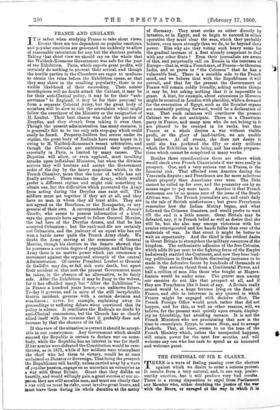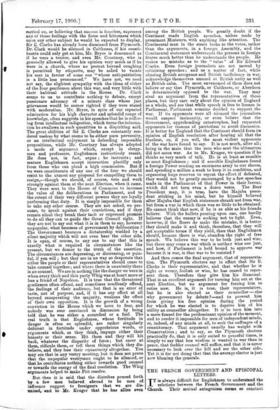THE DISMISSAL OF SIR E. CLARKE. T HERE is a wave
of feeling passing over the electors against which we desire to enter a serious protest. It results from a very natural, and, in one way, praise- worthy emotion, but it will produce very bad results. There is a strong disposition to expel from Parliament any Member who, either doubting the justice of the war with the Boers, or enraged at the way in which it is carried ou, or believing that success is hopeless, expresses any of those feelings with the force and bitterness which upon any other subject he would be expected to display. Sir E. Clarke has already been dismissed from Plymouth. Dr. Clark would be silenced in Caithness, if his consti- tuents could only get at him, Mr. Bryce is denounced as if he were a traitor, and even Mr. Courtney, who is generally allowed to give his opinion very much as if he were in a church, where no protest beyond coughing is permitted by etiquette, may be asked to vacate his seat in favour of some one " whose anti-patriotism is a little less pronounced." We have not, we need not say, the slightest sympathy with the ideas of either of the four gentlemen about this war, and very little with their habitual attitude in the House. Dr. Clark seems to us to contribute nothing to debate, except passionate advocacy of a minute class whose just grievances would be sooner righted if they were stated with moderation. Mr. Bryce, in spite of our repeated admiration for his high character and splendid range of knowledge, often suggests in his speeches that he is suffer- ing from intellectual indigestion, which turns the informa- tion he swallows in such quantities to a dispiriting acid. The great abilities of Sir E. Clarke are constantly ren- dered useless by what seems to be either pure perversity, or an intellectual enjoyment in defending impossible propositions, while Mr. Courtney has always adopted a mode of argument which, except in clergy- men and professors, Englishmen instinctively resent. He does not, in fact, argue ; he instructs ; and mature Englishmen accept instruction placidly only from those who can plead a high commission. But if we were constituents of any one of the four we should resist to the utmost any proposal for compelling them to resign,—though we should, of course, vote and work strongly against them at the next Election, when it came. They were sent to the House of Commons to increase the value of the deliberations in Parliament, and to the extent of their very different powers they are loyally performing that duty. It is simply impossible for them to take any other course. They are not asked, we pre- sume, to speak against their convictions, and if they remain silent they break their tacit or expressed promise to do all they can to guide the Great Council right. If they are not to say out what it is in them to say, however unpopular, what becomes of government by deliberation ? The Government becomes a dictatorship wielded by a, silent majority which will not even hear the other side. It is open, of course, to any one to say that this is exactly what is required in circumstances like the present, but we demur to the truth of the assertion. The circumstances are depressing, or distressing, or pain- ful, if you will ; but they are in no way so desperate that either the people or their representatives should cease to take counsel together; and where there is unanimity there is no counsel. We are in nothing like the danger we were in when every thick and thin party Whig was at heart more or less a friend of Napoleon. It is true that the threatened gentlemen often offend, and sometimes needlessly offend, the feelings of their audience, but that is an error of taste, not of purpose, and, if it has any effect at all beyond exasperating the majority, weakens the effect of their own opposition. It is the growth of a wrong conviction in the House which we have to fear, and nobody was ever convinced in discussion by being told that he was either a scoundrel or a fool. The real truth is that Englishmen, whose fortitude in danger is often so splendid, are rather singularly deficient in fortitude under opprobrious words, or arguments which, as they think, impugn either their honesty or their sense. Hit them and they will hit back, whatever the disparity of force ; but sneer at them, ridicule them, or tell them things which they dis- believe, and they lose their equanimity altogether. You may see that in any vestry meeting, but it does not prove that the unpopular vestryman ought to be silenced, or that he contributes nothing either towards good counsel or towards the energy of the final resolution. The Whig arguments helped to make Pitt resolve.
But then it is said that the diatribes poured forth by a few men believed abroad to be men of influence suggest to foreigners that we are dis- united, and to Mr. Kruger that he has allies even among the British people. We greatly doubt if the Continent reads English speeches. unless made by prominent Ministers, with anything like attention. The Continental man in the street looks to the votes, rather than the arguments, in a foreign Assembly, and the Continental statesman understands the persons in foreign States much better than he understands the people. He makes no mistake as to the " value " of Sir Edward Clarke. Even foreign journalists are not moved by criticising speeches ; and as a matter of fact, while abusing British arrogance and British inefficiency in war, acknowledge themselves amazed at British unity as well as British calm. The most envenomed of them does not believe or say that Plymouth, or Caithness, or Aberdeen is determinately opposed to the war. They may steal an argument from the representatives of those places, but they care only about the opinion of England as a whole, and see that while speech is free to licence in Parliament, Parliament remains decided to support the war. If its opponents were all silenced the journalists would suspect insincerity, or even believe that the Government, apprehending catastrophes, had requested opponents for reasons of patriotism to avoid discussion. It is better for England that the Continent should form its opinion of English resolution after hearing all that the frankest, or, if you will, the most violent opponents of the war have found to say. It is not much, after all ; being in the main that the men who sent the ultimatum did not mean war. As to Mr. Kruger, we question if he thinks so very much of talk. He is at least as sensible as most Englishmen ; and if sensible Englishmen found a foreign Power sending an enormous army to our shores, and spending a million a week to keep it in condition, and organising huge reserves to repeat the effort if defeated, they would not be greatly encouraged by a few speeches made in the Parliament of that Power in their favour, which did not turn even a dozen votes. The Boer President may, it is true, have the Blajuba, prece- dent sticking in his mind, but he himself believed after Majuba that English statesmen shrank not from war, but from a war in which there was so little to be obtained. He cannot think that now, if he is as able as his friends believe. With the bullets pouring upon one, one hardly believes that the enemy is seeking not to fight. Even, however, if the Boers do make the mistake, it is better they should make it and think, therefore, that they will get acceptable terms if they yield, than that Englishmen should, because there is war, abandon the right of free speech. We believe this war to be both just and wise, but there may come a war which is neither wise nor just, and how, if Parliament is held bound to approve war because it is war, is that war to be resisted ?
And then comes the final argument, that of representa- tion. The Plymouth electors say in effect that Sir E. Clarke is their representative, and that whether he is right or wrong, foolish or wise, he has ceased to repre- sent them. Therefore they give him his dismissal. That is an excellent argument for turning him out at the next Election, but no argument for forcing him to retire now. He is, it is true, their representative, but he is also elected as their counsellor—else why government by debate ?—and to prevent him from giving his free opinion during the period for which he was elected is to deprive him of his utility as counsellor altogether. It is to turn him into a mere funnel for the predominant opinion of the moment, and to render it impossible for men of independent minds, or, indeed, of any minds at all, to seek the suffrages of a constituency. That argument usually has weight with Conservatives ; and to say, as the Plymouth electors practically do, that it is only suited to peaceful times, is simply to say that less wisdom is wanted in war than in i peace, that feebler counsel will suffice, and that it is never necessary to look over the hill and see the other side. Yet it is for not doing that that the average elector is just now blaming the generals.







































 Previous page
Previous page